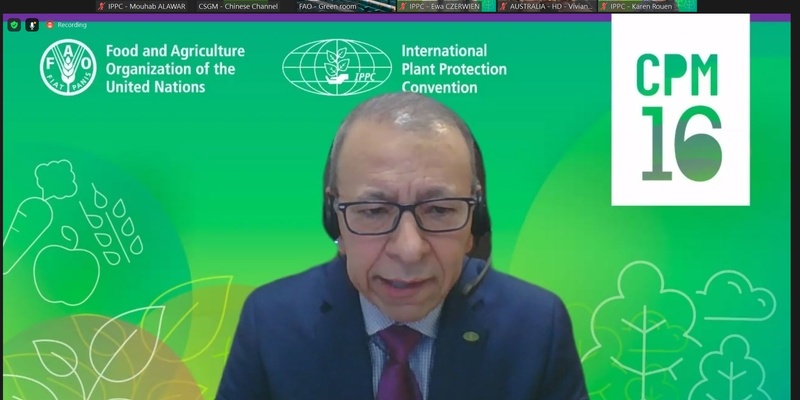Let’s Talk About... New Topics In The IPPC Work Programme
Posted on Fri, 08 Apr 2022, 10:28

Rome, 8 April 2022. The Commission on Phytosanitary Measures (CPM) has adopted new topics on standards and implementation for inclusion in the work programme of the International Plant Protection Convention (IPPC).
The CPM adopted four priority topics recommended by the IPPC Task Force on Topics (TFT) in consultation with the Standards Committee (SC) and the Implementation and Capacity Development Committee (IC). These include:
- Annex to ISPM 46 (Commodity-specific standards for phytosanitary measures): International movement of mango (Mangifera indica) fruit;
- Field inspection (including growing season inspection) (Annex to ISPM 23: Guidelines for inspection);
- Revision of ISPM 26: Establishment of pest free areas for fruit flies (Tephritidae); and
- Developing a new IPPC guide on performing audits in the phytosanitary context.
The CPM also adopted the TFT’s six recommended topics on diagnostic protocols to be annexes to ISPM 27 (Diagnostic protocols for regulated pests), including:
- Spodoptera frugiperda;
- Drosophila suzukii (Diptera: Drosophilidae);
- Tomato brown rugose fruit virus;
- Bactrocera zonata;
- Dickeya spp. on potato; and
- Heterobasidion annosum.
The CPM has also requested the SC and the IC to integrate the new topics into their respective lists of topics. The CPM likewise encouraged contracting parties (CPs), regional plant protection organizations (RPPOs), and other interested parties to support the delivery of high-priority topics to participate in the expert working groups that will be drafting the standards and engage with other national plant protection organizations (NPPOs) and RPPOs during the IPPC country consultation periods.
These new topics in the IPPC work programme will contribute to reducing gaps in the IPPC Framework for Standards and Implementation. The framework lists existing and proposed standards and implementation resources and identifies the strategic objectives and key result areas associated with each.
Moreover, the newly adopted topics contribute to achieving the objectives of the IPPC Strategic Framework 2020-2030, particularly to enhance global food security, increase sustainable agricultural productivity, and facilitate safe trade, development and economic growth.
“The IPPC community works tirelessly in developing science-based international standards for phytosanitary measures that are adopted by the CPM, the governing body of the IPPC,” said Steve Cote, Chairperson of IPPC Task force for Topics.
“In 2021, the Task force for Topics received and evaluated several sound proposals for new topics for standards and implementation resources that I believe, will be crucial for further international harmonization of phytosanitary measures and in the promotion of global cooperation on the facilitation of safe trade of plants, plant products and other regulated articles,” Steve Cote added.
How it helps NPPOs
The IPPC call for topics is an opportunity for NPPOs to identify subjects for which additional guidance would be beneficial and would help them improve the implementation of the IPPC, its standards and CPM recommendations. New topics will be critical in further harmonizing international phytosanitary measures and promoting global cooperation towards facilitating safe trade. For instance, the provision of Annex to ISPM 23: Guidelines for inspection on the priority topic on field inspection will provide NPPOs with a sufficient understanding of the concept and its objectives and aid them in conducting field inspection.
Field inspection, including ‘growing season’ inspection, is one of the effective phytosanitary measures that many countries have adopted as an import requirement. It requires exporting countries to inspect field crops, seed crops, and mother plants in the fields. However, standards including ISPM 10, 12, 20, 36, and 38 describe field inspection or growing season inspection but do not stipulate guidelines that focus specifically on field inspection. This causes unharmonized and less transparent conduct of field inspections by CPs. Providing Annex to ISPM 23: Guidelines for inspection will thus be beneficial to NPPOs.
NPPOs are increasingly using audits to help them fulfill their responsibilities under the IPPC and audits are referenced in many adopted ISPMs. With the recent adoption of the new standard on Audit in the Phytosanitary context (2015-014), the IPPC will complement it by adding a new implementation guide on performing audits in the phytosanitary context to the ICD List of Topics. This new guide would assist NPPOs in implementing the new ISPM and support NPPOs in taking a common approach in applying audits to the phytosanitary context.
In addition, the newly added topics will also provide sustainable pest risk management options. When implemented widely, these will help minimize pest impacts throughout production and harvest and lessen the need for end-point treatments.
NPPOs will be able to build strong capacities to monitor, detect, diagnose, report, and prepare rapid responses to pest outbreaks. This will help curb the significant impact on food supplies, deter the spread of pests and lessen the threat of pest introduction and spread to other regions and trading partners. This will ultimately contribute to greater market access and reduced notification of non-compliance.
Furthermore, IPPC guides and training materials provide NPPOs with accurate and easy-to-understand technical information designed to assist them in implementing the Convention, its international standards, and CPM recommendations.
Additional related information:

